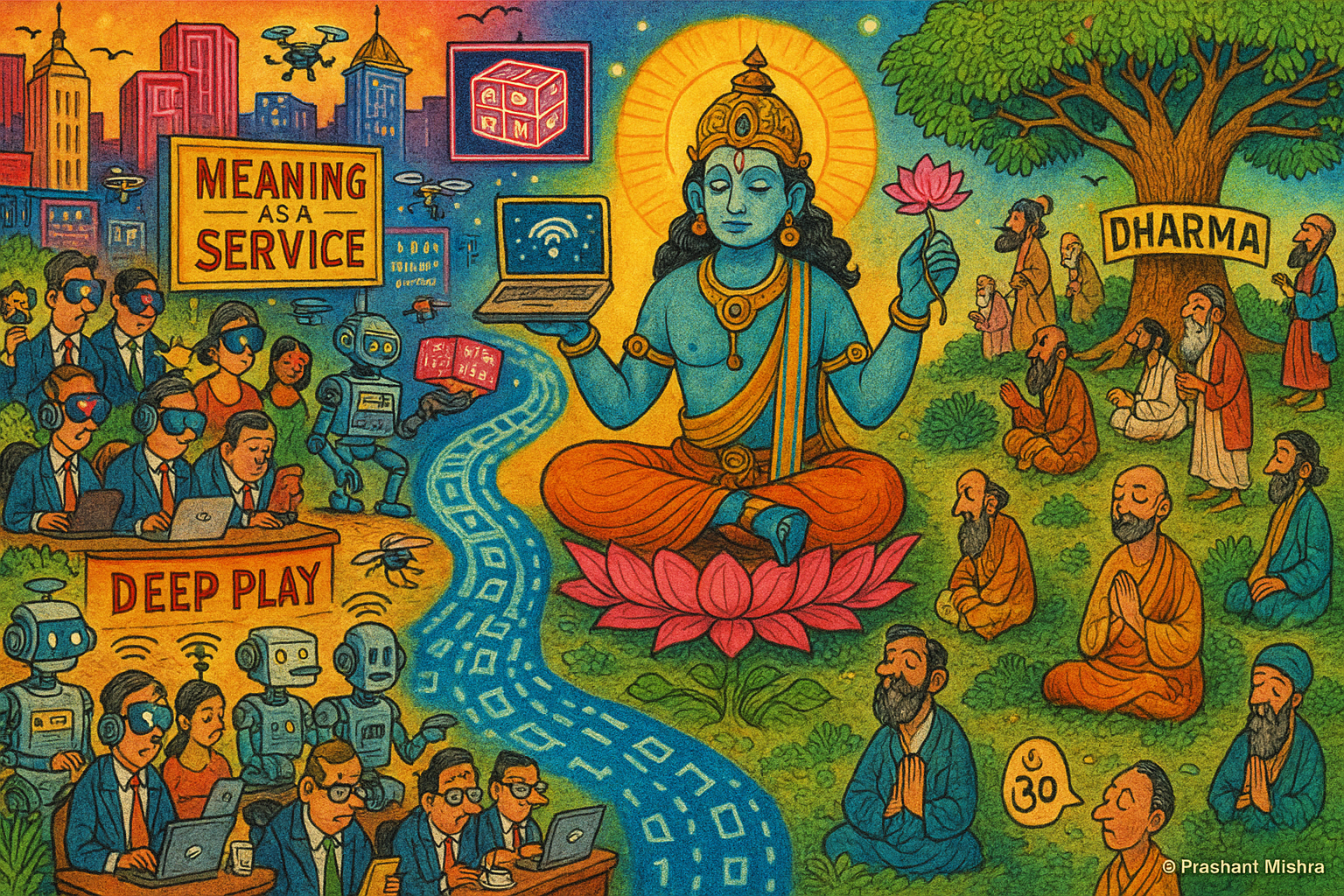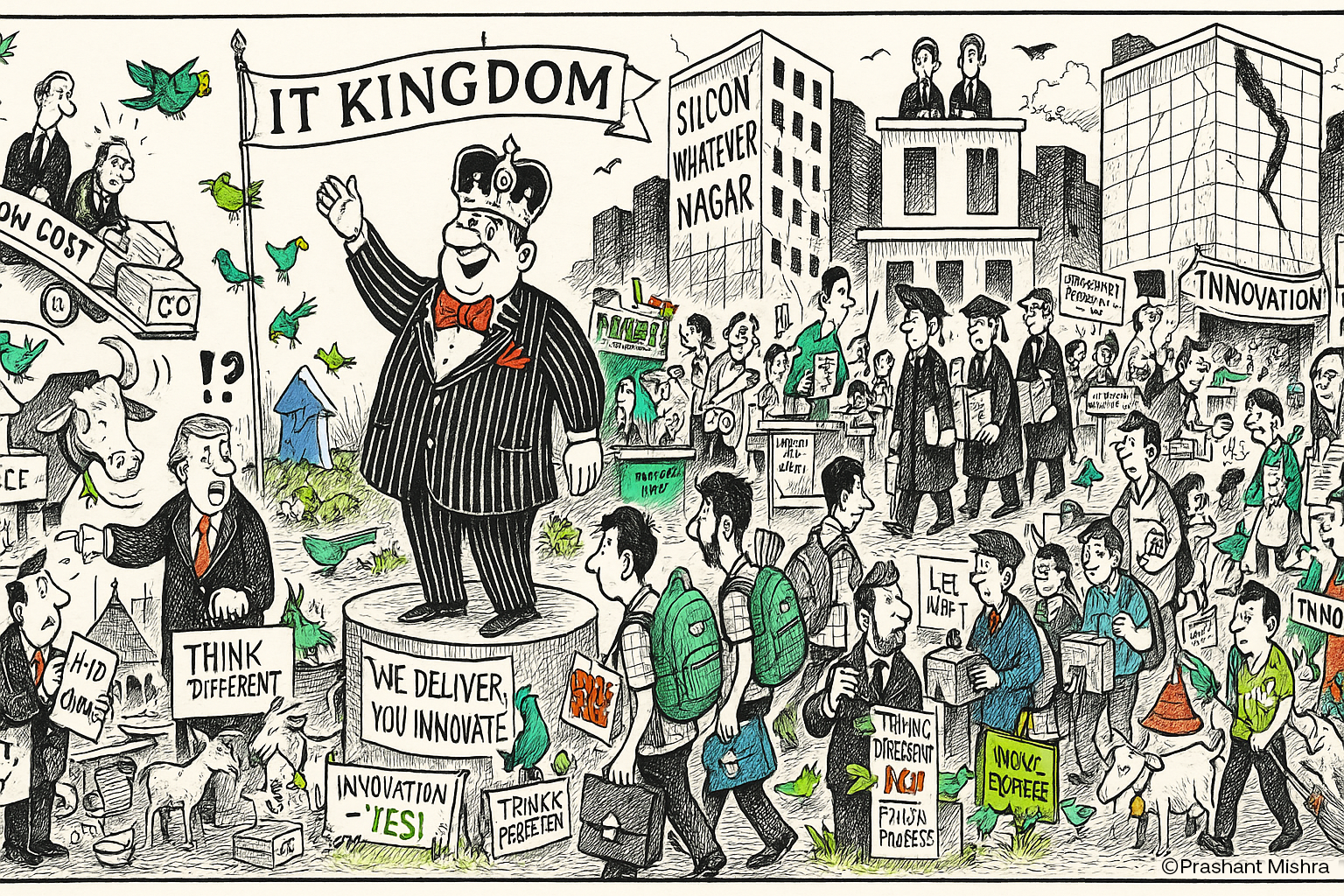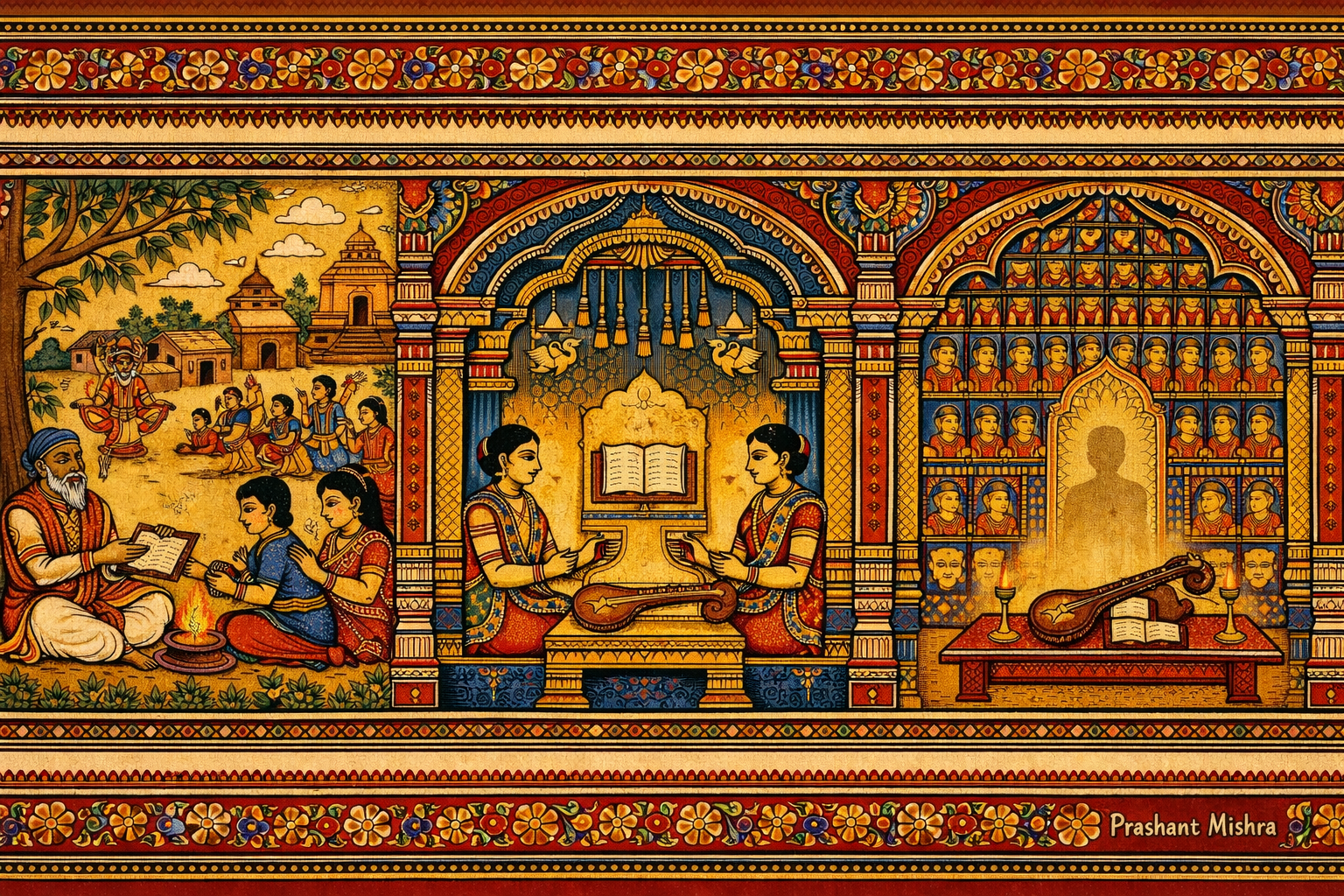
The Gita, AI, and the Future of Human Purpose
I recently revisited Yuval Noah Harari’s provocative essay ‘The Meaning of Life in a World Without Work.’ [Link] It is an interesting article in which he proposes that when AI renders work obsolete and human labour becomes redundant then there would be a large-scale decoupling of human dignity from economic prosperity. Therefore, in such a future when AI renders vast populations economically redundant what happens to society?
Harari suggests that in such a post-work scenario those humans who are no longer defined by employment may become the “useless class” that may be sustained by a universal minimum wage but will be plagued by a crisis of purpose. In such a scenario, he imagines the ensuing void being filled by what he calls ‘deep play’ almost like an immersive, game-like simulation that substitutes for meaning. It is here that Harari makes his most astounding observation. He likens religion to some kind of multiplayer game that is governed by imaginary rules and point system where the player advances to the next level “heaven” when he has accumulated certain number of points.
Harari is an intellectual par excellence and although his observation is quite provocative it completely underestimates the theological depth of religion, religious traditions, and totally misconstrues the nature of human existence and meaning. Yet, few frameworks disprove his observation more thoroughly than Indic theology. The Bhagavad Gita, The Mahabharata, The Ramayana, The Upanishad all offer fundamentally different version in which human life has intrinsic purpose grounded not just in employment (Artha) or pleasure (Kama) but also in righteousness (Dharma) and liberation (Moksha) which together enable the soul to communion with the ultimate reality.
The principal question he attempts to answer is that when economic usefulness declines how shall meaning be supplied? To which his simple answer is by “self-description”. This line of reasoning implies that meaning is a fiction generated by the mind itself and, by extension, that religions are successful virtual realities: compelling, yet ultimately fictional.
Work is not the core of human dignity. The Hindu religion locates dignity not just in productivity but also in relation between the creature and its divine creator. Therefore, work is just one aspect of participation in creation. In the Gita Krishna says: shreyaan svadharmo vigunah paradharmaat svanushthitaat. Which means one’s own duty even if imperfect is superior to another’s duty performed perfectly. Here duty is not employment or economic labour. Instead, it is the unique participation of each being in the cosmic order and it is this participation which provides the meaning.
Being useless in the market term does not erode one’s dignity because Dharma is metaphysical not occupational. Work is not the foundation of human worth. And the fact that it has been made into one is the core idea of the capitalist agenda something that was propounded by utilitarian thinking. Each being’s true worth and meaning lies in acting in accordance with nature, because when agency alliance with action that does not hanker for rewards, dignity is secured irrespective of market valuation. A post-work world does not produce “useless people” it only exposes the fallacy of our modern worth metrics.
Religion is a metaphysical construct not a computer game. The article reduces religion to a set of arbitrary prohibitions rules and rewards. Religion is not some fiction generated using computer code but experiences and ideals that enable humans to align with the ultimate reality. To say that religious tenets are imaginary constructs is like saying music is just vibration travelling through air and completely downplaying the transcendental effect it has on the listener. Indic philosophy is rich with such examples. The Mahabharata repeatedly talks about austerities rights and traditions not as illusions but means for moral and spiritual transformation.
Human mind is not a reliable arbiter of the reality until disciplined. Religion and its rites supply that discipline. The Bhagavad Gita frames human life as the active participation in the cosmic order through action (karma) knowledge (gyana) and devotion (bhakti). These are methods to align with the real not the instrument of self-authored fiction. The ultimate truth is not invented by humans instead it is something to be discovered through effort, revealed through tradition, and realised in the consciousness.
Apart from this, there is an imminent danger in escapist games. Finding purpose in artificially created immersive worlds is fraught with peril. Consumerism, games, or any kind of digital rituals risk trapping its users into an endless cycle of distraction. Hindu epics have constantly warned against such entrapments. Again, in the Mahabharata the addiction to the game of dice is depicted not as a play but as a destructive illusion that consumes kingdoms and becomes the trigger to a bloodbath. The text meticulously records of how playful mechanisms when weaponized by pride, envy, corrupt perception, and evil intent destroys bonds and inaugurates catastrophe. This happens because the game offers a self-contained world of rules and rewards that seduce the player into mistaking convention for moral reality.
The fundamental premise of the analogy that religion is an elaborate Virtual Reality system is that it is all about rules and rewards. Nothing could be further from this. This is because only in a game, rules define the world. In religion, it is selfless action and discipline, that reveals of world that is already there.
In today’s age, AI and digital interventions have ushered an attention economy which under the conditions of abundant leisure goads humans towards the pleasant – pleasure, novelty and dopamine hits through random “likes”. This is the default human setting. Over two millennia ago, the Katha Upanishad (1.2.1) warned of this very illusion. It distinguishes between the good and the pleasant which then becomes the foundational concept of attention ethics. The role of religion and rituals is to educate the mind so that the attention settles on the good which is truth, love, and liberation. The incorrect assumption that meaning is whatever keeps the user occupied and content confuses the merely “pleasant” with the truly “good”. Meaning cannot be some random subjective stimulation that just feels purposeful. Instead, it is in the participation in the real that reorders purposefulness. Thus, religion is the destroyer of illusions not the creator. In the ending chapters of the Mahabharata, it teaches that without the constraint of Dharma the pursuit of Kama (desire), Artha (commerce) can become unbridled. Play will turn into predation. A VR game that optimises on engagement risks the amplification of attachment and aversion. It does not provide meaning it delivers bondage.
Meaning is not some fictional story fabricated by humans. It is a metaphysical truth that needs to be discovered. The pursuit in life is not to overcome boredom but to discover or realise this truth. A world where AI displaces human labour does not end meaning but it reorients it. Abundance and automation do not mean halting, it means movement from “deep play” to “deep reality”. Machines may free humanity from economic labour but not from the pursuit of purpose. The Bhagavad Gita teaches this very fact that action without attachment to results, accumulation of knowledge, and devotion is the true path to finding purpose. Therefore, the task ahead is not to construct new illusions but to cultivate discipline that orients us towards transcendence.
This becomes important to understand because in a post-work world the struggle over desires is only bound to intensify. Commercial interests will definitely try to colonise attention. The lure will be intense and mind-blowing, and the only way out is through ‘ekagrata’ which is which only religion can teach. Religion is not some point accumulation game but an alignment of the being with the divine irrespective of success or catastrophe. Heaven is not some next level unlocked by fabricated rules, but the consummation of life well lived in the pursuit of the truth.
John B Calhoun’s mouse utopia experiment, Universe 25, bore quite some similarity to Harari’s vision. In the experiment the abundance of food, water, and shelter removed all pressure of survival in the sample mouse population. This initially led to flourish but eventually order eroded and the mouse society devolved into violent unimaginable collapse. Calhoun called this the “behavioural sink”, pathology of purposelessness amidst abundance. Harari suggested the intervention of deep play to overcome this purposelessness while Callahan presented just a very dark picture. But both illustrate that without genuine roles or structuring principles, abundance eventually collapses into dysfunction and extinction.
In this way both have done great service by isolating the question of purpose in the face of abundance. But Harari’s remedy of “VR” play which is includes re-branding of religions is a complete misread of the true tenets of theology and the human capacity of the pursuit of truth. Indian philosophy offers many ways instead of just a scoreboard. The Upanishads, The Bhagavad Gita, The Mahabharata constantly reiterate this very fact: Dignity resides in the being not in wages, purpose in alignment, and meaning in discovery.
When the engines of modern world relief us from some necessities they do not remove our vocation. They only clear our desks so that ancient work can be done. They guide us not to construct new fiction – a carnival of distraction – but to rediscover ancient truths. To see truly. To love rightly. To act without grasping. All this until the knower, the known, and the knowing are found to be one.
In the Isha (Īśa) Upanishad, there is a "Peace Chant" or the "Purnamadah Shanti Mantra." The original Sanskrit version is:
Om Purnamadah Purnamidam Purnat Purnamudacyate
Purnasya Purnamadaya Purnamevavashishyate
Om shanti shanti shanti
A common English translation is: That is whole; this is whole; from the whole, the whole becomes manifest. Taking away the whole from the whole, the whole remains. Om Peace! Peace! Peace!
This mantra is traditionally recited at the beginning of the Isha Upanishad and is highly revered in Vedantic philosophy as a profound statement about the infinite, unbroken, and perfect nature of ultimate reality.


